Freelancer on the Front Lines
Santiago Bertolino
2016
| 98 min 13 s
Festivals and Awards
CLOSING FILMRIDM 2016
Official SelectionDOXA Documentary Film Festival 2017
Official SelectionGuangzhou, International Documentary Film Festival (GZDOC) 2017
AVAILABLE ONLINE MAY 3!
Short Synopsis
Canadian freelance reporter Jesse Rosenfeld has made the Middle East the focus of his work, and to make a living he has to keep up with constantly moving news targets. Freelancer on the Front Lines follows his journey across the region, showing us thorny geopolitical realities shaped by the events transforming the Middle East and exploring how journalism practices have changed in the age of the Internet.
Whether covering the dashed hopes of the Egyptian revolution, the upheavals in the Israeli-Palestinian conflict from Ramallah or Gaza, the reality of refugee camps in Turkey, or the faultiness of Iraq’s bloody divisions, the man is on a mission to share the issues on the ground with his readers. But to cope with the new communications jungle, choose the subjects he wants and make the front page, he must set himself apart from traditional mass media. With the thrilling pace of an action film, the documentary captures the ups and downs of a new and unconventional kind of journalism.
Accompanying Jesse in his quest for truth, Freelancer on the Front Lines highlights the importance of independent news—journalists who aren’t afraid to get to the heart of a story in a media landscape that too often relies on press releases and spin.
What makes Jesse Rosenfeld tick? A freelance reporter based in the Middle East, Jesse has made the region the focus of his work. Freelancer on the Front Lines accompanies him in his daily life as he criss-crosses Egypt, Israel and Palestine, Turkey and Iraq. Examining thorny geopolitical realities shaped by the events transforming the Middle East, the documentary follows Jesse as he chases the news to make a living, and explores how journalism practices have changed in an ever-shifting media landscape.
When war zones call, Jesse answers, driven by an idealism that demonstrates his faith in humanity. Whether covering the dashed hopes of the Egyptian revolution in Cairo (sitting through the trial that jailed Canadian-Egyptian journalist Mohamed Fahmy and reporting from the streets as the military consolidates power), war and occupation in Israel-Palestine from Ramallah to Gaza, the spillover of the Syrian civil war into refugee camps in southeastern Turkey, or Kurdish fighters confronting the armed militants of the Islamic State in northern Iraq, the man is on a mission to share the issues on the ground with his readers. He conveys the impact of these historic events by telling the stories of those living through them. Observing him as he works, Freelancer on the Front Lines joins a man who is always on the move, continually navigating the fray of the modern media landscape while reporting the news he thinks you need to hear and hoping to make the front page.
Jesse is a new breed of reporter. Documenting his journey through conflict zones, the film shows the new reality of freelancers who have to adapt to major upheavals in the media landscape and the ongoing crisis in print journalism. On the fringes of traditional media, a new type of journalism has emerged, and Freelancer on the Front Lines shows us what goes into this frantic quest for news.
In exploring the obstacles Jesse must overcome, the documentary examines the chaotic environment reporters must contend with. For Jesse, who belongs to the generation that grew up with the Iraq war in the headlines, it’s important to contextualize and never hold back, even when discussing the West’s share of the blame for violence, oppression and destruction in the Middle East.
Combining interviews with Jesse, his reporting in the field, his articles, and archival news, Freelancer on the Front Lines uses many angles to present a profile of this new journalism in the digital age. With the thrilling pace of an action film, the documentary follows Jesse on his perpetual travels and keeps viewers on the edge of their seats. Relaxing from time to time back in Toronto, temporarily away from the noise of the world, Jesse reveals other aspects of his personality: haunted by scenes of horror, he’s a seasoned professional who never claims to be a hero. The prisoner of a never-ending cycle, he soon returns to the task of chasing news under foreign skies, with just one hope: to engage his readers with the realities of the region in which he lives and give them the information they need to understand and act.
Freelancer on the Front Lines provides a window into the deep-seated struggles shaping today’s Middle East, and offers an insider’s look at the importance of independent, critical news coverage in a media landscape that too often tends toward convergence.
Interview with Santiago Bertolino
1. How did you meet Jesse Rosenfeld, and why did he become the subject of your film?
I met Jesse for the first time in 2011, on the Gaza Freedom Flotilla. The Canadian delegation’s boat was anchored in Crete and was going to go to Gaza to symbolically break the blockade and bring humanitarian assistance to the people.
There were pro-Palestinian peace activists on board and four or five journalists who had been invited to cover the exploit. I had been approached by the organizers to report on the project, and I had managed to get the newspaper Métro to commission me to do written reports on the flotilla. At the time, I wanted to give journalism a try.
So that’s how I met Jesse. He was one of the invited journalists on the boat. I was instantly fascinated by him as a character. He was a 27-year-old journalist from Toronto who had decided to live in Ramallah and report on the situation in Palestine. He seemed passionate, had a good understanding of the reality of the activists on the boat and had in-depth knowledge of political issues in the Middle East. He was working as a stringer and managing to live off his articles while maintaining a critical point of view on the situation. I had always wondered if it was possible to make a living as an engaged journalist, and Jesse was proof that it could be done.
He stayed in my mind, and I gave Jesse a call two years later, in 2013. I had just finished my first feature documentary, Red Square on a Black Board, and was looking for a new subject. I wanted to do a dynamic documentary on the political situation in the Middle East. I was wondering what would happen after the Arab Spring. And I just said to myself, “Why not discover the Middle East through the experience of a young freelance journalist? Why not follow Jesse directly on the ground and see what the life of a freelance journalist is like? Plus, the world of journalism is in crisis, print media is undergoing profound changes. It’s a hot topic! And it’ll be possible to follow the news of the region through him.”
Jesse seemed like the ideal person for what I wanted to do. I often work like that: an idea grabs hold of me and won’t let go—the only way to free myself from it is to do the project.
When I contacted him, he happened to be visiting Montreal. We met and I told him I wanted to follow him on the ground over a long period of time. The next day, I did an initial interview with him, in Mount Royal Park, to see how he was on camera. It went perfectly! He was talkative, fascinated by the political situation in the Middle East and completely natural. After the interview, he said, “Okay, man, you can meet me in Ramallah in a month.” A month later, I had put together a bit of money to get there on my own, and that’s how it all started. After I got back, 10 days later, I made a small demo video and pitched it to the NFB, which signed on for the project.
2. What is it about the occupation of freelance journalist that interested you?
A freelance journalist is a journalist who is not an employee. He’s free, independent. This lets him write the articles he really wants to—he doesn’t have a boss. It’s an enviable situation because there’s no editor telling him what to report on, but on the other hand he doesn’t have good working conditions: he has to sell each individual article, he doesn’t have a fixed salary and no employer is responsible for him. If something happens, he’s on his own. He’s more vulnerable.
I became interested in this type of journalism because there are more and more freelance journalists competing on the ground these days. The crisis that’s been affecting print media since 2004 has left many journalists unemployed, so they’ve had to work as freelancers. Same thing for younger journalists like Jesse: they have very little chance of finding a permanent job on a major paper, so they too have to work as freelancers and sell their work article by article.
Describing the occupation of freelance journalist is my way of taking stock of the difficult situation in the world of journalism right now. We see it in the film. Jesse is free to write whatever articles he wants, but it’s a constant struggle to sell them. It’s a fairly precarious lifestyle. Since he’s paid by the article, he has to keep coming up with subjects and pitch them to different newspapers that might be willing to publish his work.
At one point in the film, he’s stuck in Istanbul, Turkey, a few days before Christmas. An editor had promised to send him to Iraq to cover the war being waged by the Kurds against the armed militants of the Islamic State group. However, the situation has changed, with more important news events occurring elsewhere in the world, so no newspaper is willing to advance him the necessary funds to go. But Jesse doesn’t give up. We see him frenetically contacting other editors. He’s determined to cover this story on the ground, but no one gets back to him. The problem is also that the budget he submitted is too high. Reporting from a war zone is very expensive, especially because you have to pay local researchers—so-called “fixers.” This time, he had to settle on another solution. He ended up going to visit refugee camps in southeast Turkey, on the Syrian border. He had to assume the risk of putting up the money for the trip himself and then try to sell his article after it was written. It’s not an easy occupation.
3. What was it like for you setting off on your own, with all your professional equipment, travelling around the Middle East, crossing borders?
The only time I worked with a cameraman was on the shoot in Israel, at the outbreak of the last war between Israel and Gaza, in July 2014.
There were some good things about it: while the cameraman thought only about filming, I was able to concentrate on my interviews, be more observant of what was going on around me and suggest things for him to shoot. And when I was with Jesse, the cameraman could go off and take beauty shots, which made for a greater variety of images. But there was a downside, too: I had to direct another person, take time to discuss things with my cameraman, and Jesse no longer tended to naturally confide in me. The close collaboration we had established on the previous shoot, in Egypt, wasn’t as strong. My being behind the camera had let Jesse speak directly to it; I found that more dynamic.
When it was just the two of us, we shared a hotel room. It sort of became his office, where he did his research, listened to newscasts and reacted to events as they unfolded. That’s how I was able to really show all the steps in writing an article and capture his impressions on the fly. Whenever something interesting happened, I’d turn on the camera. It was very much the “camera-pen” concept: I filmed like a reporter jotting down notes; it was very reactive.
So most of the time I was a one-man band, working as director, cameraman and sound recordist. Actually, I had often worked that way, so I was used to it. When I first started making social documentaries 15 years ago, that’s how I worked. Mostly from necessity due to a lack of funding—I couldn’t afford to pay a crew with a cameraman and sound recordist. But it taught me to be efficient. And I like doing my own filming! It’s mainly the sound that becomes a bit more complicated. For instance, I have to handle the lapel mike, manage to change batteries with one hand while holding the camera with the other, and so on. I ditched my tripod: there was just too much equipment for one person to lug around. So most of the scenes in the documentary are shot with a handheld camera, which requires a certain endurance. After a day’s shoot—sometimes as long as 14 hours—I’d be totally wiped. But I did it!
4. Is the film a form of social engagement?
In Freelancer on the Front Lines, my social engagement is expressed by my choice of character, a freelance reporter who practises a type of journalism that is more engaged than what one usually reads in the mainstream press. It stems from the topics he covers, but fairly often also from how he addresses them. Jesse adopts an editorial slant that most of the major papers wouldn’t dare take so openly. Take, for example, the titles of his articles on the latest war in Gaza: “Israel’s Campaign to Send Gaza Back to the Stone Age,” “Under American Bombs in Gaza: Food for Palestinians and Bombs for Israel. Uncle Sam gives to both—just not equally.” Or his article on the political situation in Egypt after the Arab Spring, in which Jesse criticizes the latest election, which he feels is a sham: “Egypt Prepares to Anoint a Dictator and Call It an Election.” Or his piece on the unjustified arrest of Egyptian-Canadian Al Jazeera journalist Mohamed Fahmy, “Al Jazeera Journalists Are on Trial in Egypt for Doing Their Jobs.” These are in-depth articles with a critical viewpoint. In an interview, Jesse says that he wants his stories to get people to take a stand on issues. “If people don’t do something about it, I don’t consider my work to be useful.”
I don’t feel that Jesse subscribes to that sacrosanct objectivity that sometimes requires journalists to maintain a balance between opposing points of view but that ends up creating more confusion than anything else on a given subject, since it leaves people no longer knowing what point of view to adopt, leading to a generalized laissez-faire attitude about the fate of the planet.
For example, when Israel’s reprisal for a Hamas attack seems disproportionate, Jesse says so and presents the facts. When the Al Jazeera journalists are wrongfully arrested, he proves it and doesn’t try to establish a balance between the government’s point of view and that of those defending freedom of the press. The truth is often found on one side of an issue: the side of human rights and social justice. This may be a debatable opinion, but it’s mine and I stick to it.
There’s also engagement in my choice of subject, in that I want to make people aware of the importance of having Canadian reporters abroad. I was recently listening to an interview on Radio-Canada. The interviewee was saying that in Quebec, only Radio-Canada and La Presse send journalists abroad, and that there are very few journalists who actually live where they’re reporting, like Jesse does. We need Canadian correspondents who live abroad and report back home—reporters that don’t just go to press conferences but are there on the ground meeting the local people, without necessarily having a military escort. That’s what Jesse does. He wants to offer his personal view of things, without being controlled by the local authorities.
Most of the information we get about the rest of the world too often depends on news agencies that only relay facts in a summary manner, without going in depth, thus creating the impression that we’re always hearing the same thing in the international news: an explosion occurred at such and such a place, the army tried to push back the enemy, etc. I feel it’s crucial for Quebeckers and Canadians to be better informed about what’s happening abroad, through a point of view they can relate to. That way, for instance, people will have a better understanding of the experience of newcomers to Canada, or it’ll be possible to counter certain racial prejudices. Information about the rest of the world helps open minds!
5. How is this documentary different from your previous films? How does it fit in with your career as a filmmaker?
With my first feature documentary, Red Square on a Black Board, which I made in 2012, I took the side of the protesters. In following the organizers of the Maple Spring, the film offered a behind-the-scenes look at social change in Quebec. In Freelancer on the Front Lines, I’m interested in someone who wants to stand as a witness, taking the side of those who don’t have a voice. The film takes place directly on the ground, following the day-to-day life of Jesse Rosenfeld, a young Canadian journalist based in the Middle East. Both are “experience films” in that I want the audience to be able to identify with the characters, to accompany them as they overcome challenges, to participate in their adventures and better understand the ideals they defend. Each of these films also addresses important current sociopolitical issues: Red Square on a Black Board is about the student crisis and funding of the educational system, while Freelancer on the Front Lines looks at the shattering of the Middle East after the Arab Spring.
My filmmaking approach has evolved since my previous documentary. In Red Square on a Black Board, my camera just observed; I was a spectator. In filming reality, I remained in the background, not really facing the character(s) or being heard on camera. Afterwards, in watching the film again, I realized that my authorial point of view on the different aspects addressed does not really come across. With Freelancer on the Front Lines, I added that missing dimension.
In this second feature documentary, I’m more interventionist in my approach to the main character. I don’t just film the action, I interact with him. My questions are heard off camera, making the audience more aware of my point of view. I become another protagonist in the film. From the beginning of the documentary, Jesse speaks directly to me. Since I’m filming myself too, the character looks directly at the camera when he answers. It becomes like a subjective gaze on his experience. In this second film, I also wanted to get closer to the character. I follow him wherever he goes, and as we face danger together we develop into a team—partners helping each other. This lessens the distance between Jesse and the camera, which gets him to open up more naturally. Everything happens in a more organic way.
Interview with Jesse Rosenfeld
Q1- How did this film come to life? How did Santiago convince you to participate in his project?
Santiago approached me late in 2013, expressing interest in directing a documentary showcasing my journalism work in the Middle East. It seemed like a good opportunity to give a second life to a lot of the stories and a lot of the issues that I’d been covering. That was the idea behind it. To document the current state of turmoil in the Middle East, whether it’s war, occupation, revolution or counter-revolution. Really he started the project as the counter-revolution to the Arab Spring got underway. It was very important for people in the West to understand these issues. And the documentary can give my work a new life for a broader audience. That was my interest.
Q2- What are some of the pros and cons of freelancing in the war zone context? Do you sometimes dream of a secure job with a big media organization?
I don’t only report from war zones, I cover political, economic and social issues across the region. I would far rather have a correspondent or staff position doing the kinds of things I’m doing. The thing about freelancing in journalism is, it’s the worst part of journalism, apart from having a job. I’m able to follow the stories that I feel are important. I’m able to dedicate my time towards issues that I think need to be read in the West and that show the major fault lines and the major struggles that people go through in the Middle East. In that sense, I really like my job.
You make no money; it’s really difficult to make a living. And the media environment makes it constantly harder and harder to make a living reporting. That’s the major drawback, and that’s also the model for a lot of the media today, where they’ve shifted to an increasingly freelance dependency model where working conditions don’t improve.
One of the major differences is that when you’re staff and when you’re with a publication, you go in with their full backing. Often I have to negotiate how much backing I’m gonna get, what expenses are gonna get covered, even though usually it should be full expenses, it doesn’t always pan out that way. Or I’m negotiating with different editors, and so it’s a process of having to take care of your own security situation and making sure that when you’re in contact with your publications and with your editor, they fully understand your situation.
However, the stories from the people in the Middle East need to be told. And that’s what drives me to keep doing it. I basically feel that telling these stories and reporting from here is probably the most important thing that I can do, and I just do it in any way that is possible. Right now it seems that freelance is the main or only option as staff jobs decrease. But if I had the option of working for a publication with that kind of security and that kind of backing, I’d obviously take it.
Q3- You say in the film that you write to bring people to act. Who is your intended audience? What actions are you hoping your work will spawn?
I report for an English-speaking audience. The great thing about the Internet is that it can be read everywhere, but I do write mostly for American publications and I target a lot of my stories towards American outlets, because the U.S. plays such a decisive role in how things play out in the Middle East. And I feel like it’s important to talk to Americans, and Brits and Canadians as well, about not only what these policies are and what they do, but also who the people in the Middle East are and how they are affected. I write about what they’re actually fighting for, what they’re experiencing, what their grievances are, to force a Western audience, and particularly an American one, into some kind of dialogue, or some kind of discussion about what is actually happening with those who actually experience the impact. That’s something that for the longest time has been difficult to get across.
In terms of what I hope people do, I don’t write so that you’re going to have academics and policy analysts and whatnot say, “Oh, I feel more informed, isn’t that great!” I write stories about what people here experience and what they say and what they want, so that people in the West can understand that, and understand what their own government’s role is and take action accordingly to counter a lot of the injustices that happen here. So they can do it in an informed way, rather than craft slogans. I want people to actually understand the intricacies, the nuances, of what’s happening here, as well as the power dynamics. Who’s calling the shots and who’s affected. So people know who’s responsible, they know who is experiencing the brunt of these policies, and they know who to target their responses to. How people respond in the West, that’s up to them, they live there. But my hope is that they walk away from my stories feeling like they have an understanding of what’s going on, and they feel obliged to engage in some way.
Q4- Has your relation to danger and fear evolved over time? If so, how?
Well, my ear for determining whether it’s fireworks or a gun or a bomb is far better. When it’s not fireworks, it’s scary as shit.
Seriously though, I understand violence in a broader context. Why people choose to revolt, what is at stake for them personally, I understand it in a far broader context than I did when I was in North America. I scale repression differently; I understand it within a wider spectrum.
I understand the cost of speaking out in a far wider spectrum. In some countries it means you go to jail. In some countries it means going out into the streets gets you shot. In some countries it means just demanding your right to self-determination under occupation is something that will land you in jail, sentenced by a military court, and your family will then be terrorized by the army.
So, I understand more deeply what these things mean to people, and why they do them, and I try to convey that alongside an understanding of what it is they’re saying, and what they’re trying to do, in that context.
Q5- Your life is split between Toronto and the Middle East. How do you manage the transitions? Have they become easier over the years?
I’ve been in the Middle East since I left university. It was in 2007 that I left, so it’s nine years at this point. That means for me, home is the Middle East right now. My wife and I both work here and have based our life together here. Toronto is where my family is, where some of my oldest friends are. When I go back to Canada it’s like a vacation, and Canada is an easy place to do that, because Canadian culture in many ways finds itself very removed from what’s happening in the rest of the world. You constantly hear in Canada, “Wow, it’s terrible what you’re seeing over there. Isn’t it great that we’re in Canada?” There’s that kind of distance. In terms of living in a society like that, I find it incredibly frustrating, ’cause there is reluctance to engage or see itself as implicated in what’s happening in the rest of the world, but in terms of going to visit it’s like a welcome break – as any summer vacation out at the cottage would be.
Jesse Rosenfeld’s Biography
Born and raised in Toronto, Jesse Rosenfeld has spent the last nine years reporting from the front lines on the biggest events shaping the Middle East. Studying international development at McGill University, he spent his student years engaging in social justice activism and working as a news editor at the McGill Daily, a student newspaper. Finishing his degree in 2007, he immediately packed up and moved to the occupied West Bank city of Ramallah where he started his international reporting career as a freelancer covering the Israeli occupation. For the next seven years he was primarily based in Israel and the Occupied Palestinian territories. Since then he has lived in Cairo, Istanbul and Beirut –where he currently resides — while also reporting in the region from Iraq and Jordan.
Bearing witness to war, occupation, revolution and counter revolution, Rosenfeld has gone to heart of the stories that have transformed the region, telling his readers about the experiences of the people living through these unprecedented upheavals. He has reported from 15 countries throughout the Middle East, Europe and North America (including Canada), for media outlets that include The Daily Beast, The Nation Magazine, Al Jazeera English, The Guardian, The National (abu Dhabi), The Toronto Star, Le Monde Dipomatique and NOW Magazine, among others.
Trailer
Clips
NFB Podcast
Canadian freelance journalist Jesse Rosenfeld, subject of the new NFB documentary Freelancer on the Front Lines, sits down with interviewer Jesse Freeston to discuss the dangers and thrills of reporting from the Middle East.
Team
Santiago Bertolino
Director
Photo
NATHALIE CLOUTIER
Producer (NFB)
Photo
Photo : Sophie Quevillon
DENIS McCREADY
Producer (NFB)
Photo
Photo : NFB
Colette Loumède
Executive Producer
Photo
Photo : NFB
Images
Loading...
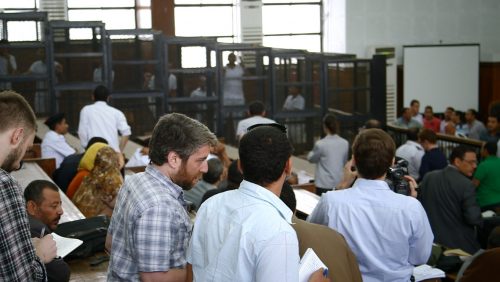
Download
Loading...
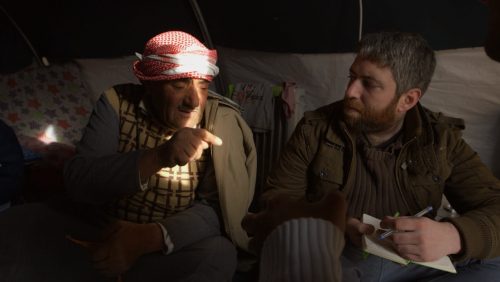
Download
Loading...
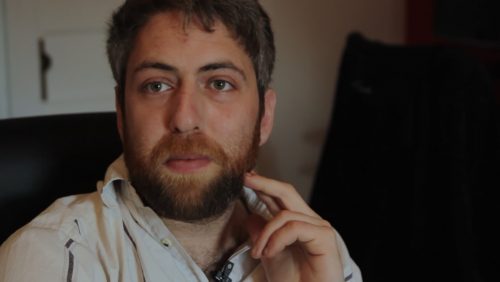
Download
Loading...
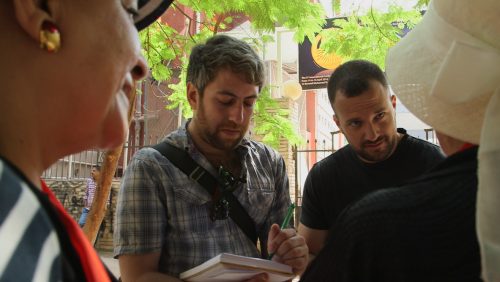
Download
Loading...
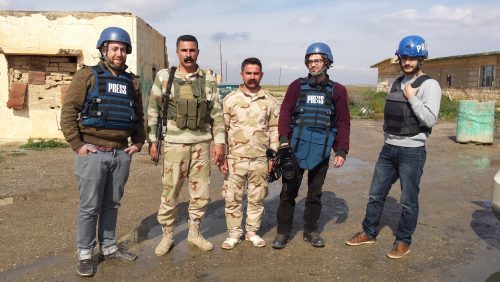
Download
Loading...
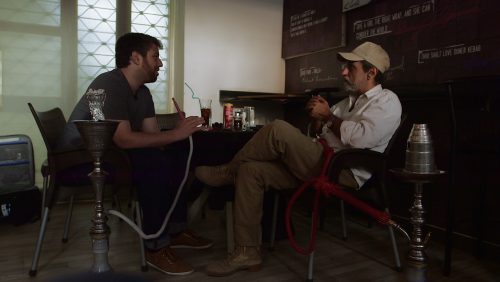
Download
Loading...
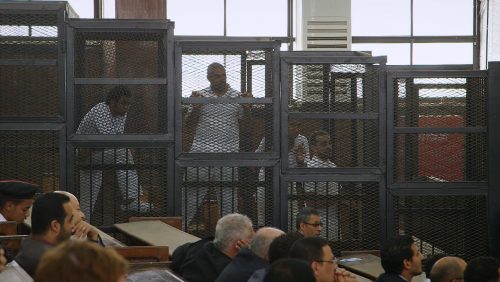
Download
Loading...
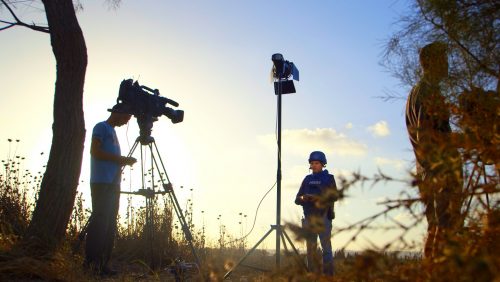
Download
Loading...
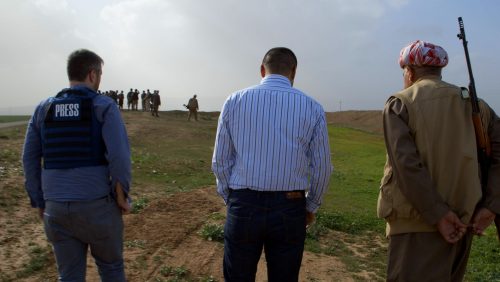
Download
Credits
With the participation of
Jesse Rosenfeld
Written and Directed by
Santiago Bertolino
Images and Sound Recording
Santiago Bertolino
Sound Design
Olivier Calvert
Additional Camera
Daniel Lanteigne
Ahmed Fadel Al Massary
Editor
Aube Foglia
Editing Assistants
Joëlle Arseneau
Marie-Eve Talbot
Technical Coordinator – Shooting Equipment
Steve Hallé
Technical Support – Editing
Pierre Dupont
Isabelle Painchaud
Patrick Trahan
Translation
Divvy Ahronheim
Kamel Bouzeboudjen
Cevat Sahin
MELS
Opening Credits and Title Design
Creative Direction and Direction
Christian Langlois
Design and Lead Motion Design
Mélanie Bouchard
Online Editing
Serge Verreault
Foley
Lise Wedlock
Foley Recording
Luc Léger
Re-recording
Shelley Craig
Music
Esmerine
Musicians
Bruce Cawdron
Rebecca Foon
Brian Sanderson
Jamie Thompson
Guest Musicians
Mishka Stein
Colin Stetson
Music Recording
James Stephens
Additionnal Music
Flying Street
Composed and Performed by
Stefan Christoff
Sam Shalabi
Participants
Abdulrahman Noori Abdulrahman
Anis Attia Anis
Allison Deger
Mohammad Husso
Nael Mosallam
Ayar Mohammed Rasool
Leora Rissin
Mark Rosenfeld
Sardar Sharif
Lia Tarachansky
Archives
Al Jazeera
Associated Press
House of commons
The Daily Beast Company
David Weiss/Shutterstock.com
France 24
ITN Source
NBCUniversal Archives
Pond 5
RT-RUPTLY
Vurb/Shutterstock.com
Rights Clearances for Archival Material
Jenny Cartwright
Marketing Managers
Karine Sévigny
Judith Lessard-Bérubé
Assisted by
Jolène Lessard
Administrator
Sia Koukoulas
Production Coordinators
Chinda Phommarinh
Gabrielle Dupont
Isabelle Limoges
Hélène Regimbal
Administrative Assistants
Pascale Savoie-Brideau
Larissa Estevam Christoforo
Technical Coordinator
Mira Mailhot
Associate Producer
Mélanie Lasnier
Producers
Nathalie Cloutier
Denis McCready
Executive Producer
Colette Loumède

Media Relations
-
About the NFB
Founded in 1939, the National Film Board of Canada (NFB) is a one-of-a-kind producer, co-producer and distributor of distinctive, engaging, relevant and innovative documentary and animated films. As a talent incubator, it is one of the world’s leading creative centres. The NFB has enabled Canadians to tell and hear each other’s stories for over eight decades, and its films are a reliable and accessible educational resource. The NFB is also recognized around the world for its expertise in preservation and conservation, and for its rich and vibrant collection of works, which form a pillar of Canada’s cultural heritage. To date, the NFB has produced more than 14,000 works, 6,500 of which can be streamed free of charge at nfb.ca. The NFB and its productions and co-productions have earned over 7,000 awards, including 11 Oscars and an Honorary Academy Award for overall excellence in cinema.